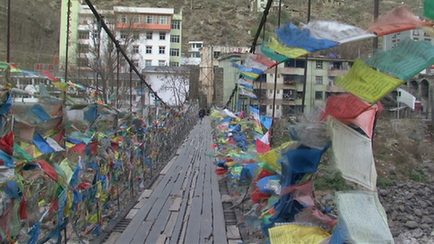Witnessing Jiarong culture in Danba
|
Prayer flags line a bridge in Zhanggu town, Danba [Mark Frank/China.org.cn] |
Zhanggu is a melting pot of Chinese and Tibetan culture. While one restaurant sells wontons and fried rice, the restaurant next door offers yak-butter tea and corn momos. The main drag in town is named Unity Street, expressing a desire for unity among ethnic groups. It is hard to deny that Tibetans, Han Chinese, Qiang, Hui and other minzu seem integrated almost seamlessly here.
On the west side of town, near the main bridge, is a non-descript monument to the Danba National Muscovite Mining Park. Its interpretive text explains that the nearby muscovite mines have been depleted after decades of intensive strip-mining, and that as of 2009 they had been converted into a tourist facility where visitors can witness the mining process first-hand. No one I asked in Zhanggu knew much about this new park, but I discovered that the conversion began around 2005, when a series of landslides prompted authorities to cut back on mining.
 0
0 









Go to Forum >>0 Comments